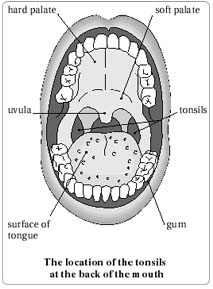What is it?
The tonsils are made of special tissues which fight infection. There are lots of other areas in the head and neck and throughout the body made of this tissue, so even without the tonsils the body can still fight infection. If the tonsils are becoming infected very often (tonsillitis), making you ill and having to take time off work, it is best to remove them.
The Operation
 You will have a general anaesthetic and be completely asleep. The surgeon removes the tonsils through the mouth and stops any bleeding. A special instrument called diathermia (a Greek word which means by applying heat) is usually used which can free the tonsils and at the same time can stop the bleeding by applying a wave of heat on the small blood vessels. Because you are completely asleep you will not feel any pain during your operation. Provided that you are eating and drinking normally, and there is no sign of any infection, you will be fit to go home one or two days after your operation.
You will have a general anaesthetic and be completely asleep. The surgeon removes the tonsils through the mouth and stops any bleeding. A special instrument called diathermia (a Greek word which means by applying heat) is usually used which can free the tonsils and at the same time can stop the bleeding by applying a wave of heat on the small blood vessels. Because you are completely asleep you will not feel any pain during your operation. Provided that you are eating and drinking normally, and there is no sign of any infection, you will be fit to go home one or two days after your operation.
Any Alternatives
There are no tablets or medicines that will stop you from getting tonsillitis. Antibiotics can help to make the tonsillitis get better.
If the tonsils are becoming infected frequently, antibiotics may not work very well. The only way to stop you getting tonsillitis is to remove the tonsils.
Before the operation
Stop smoking and get your weight down if you are overweight. (See Healthy Living). If you know that you have problems with your blood pressure, your heart, or your lungs, ask your family doctor to check that these are under control. Check the hospital's advice about taking the Pill or hormone replacement therapy (HRT). Check you have a relative or friend who can come with you to the hospital, take you home, and look after you for the first week after the operation. Sort out any tablets, medicines, inhalers that you are using. Keep them in their original boxes and packets. Bring them to the hospital with you. On the ward, you may be checked for past illnesses and may have special tests to make sure that you are well prepared and that you can have the operation as safely as possible.
Please tell the doctors and nurses of any allergies to tablets, medicines or dressings. You will have the operation explained to you and will be asked to fill in an operation consent form. Many hospitals now run special preadmission clinics, where you visit for an hour or two, a few weeks or so before the operation for these checks. If you have a cold or tonsillitis in the week before your admission to hospital, please telephone the ward and let the ward sister know. The operation will usually be put off, and you will be given time to get better before being sent for again. You will need to get over the cold or the tonsillitis before you have the operation because by having an anaesthetic, the cold or the tonsillitis could turn into a serious chest infection.
After - In Hospital
You may be given oxygen from a face mask for a few hours if you have had any chest problems in the past. To start with you will have a sore throat and some stiffness of your jaws. You may also find that you have a mild earache. The nurses will give you medicine or an injection to help with the soreness. Ask for more if the pain is not well controlled or if it gets worse. A general anaesthetic may make you slow, clumsy and forgetful for about 24 hours. The nurses will help you with everything you need until you are able to do things for yourself. Do not make important decisions during this time. It is very important for you to eat and chew solid, soft food (normal meals not just drinks), as soon as possible after your operation. Some ice cream is an ideal first meal after this operation because it's soft and offers comfort for the sore throat. It will be a bit difficult initially to have solid food but actually makes your sore throat go away more quickly. Solid, chewed food going down your throat will keep it clean and help it to heal up. If you do not eat and chew normal food, but only take drinks, your throat will become sore with the risk of infection, and bleeding, all of which will prolong your stay in hospital. Before leaving the ward you may be given an appointment to come back to the ENT (ear, nose and throat) outpatient clinic for a check-up. Some hospitals leave check-ups to the general practitioner. The nurses will advise about sick notes, certificates etc.
After - At Home
Take painkilling tablets every six hours to control any sore throat. Eating and chewing solid, soft food is just as important at home. Crisps, corn flakes, toast and similar sharp or hard food should be avoided for the first week. You should be fit to return to work 10 days after your operation. You will be fit to drive one or two days after your operation.
Possible Complications
As with any operation under general anaesthetic, there is a very small risk of complications related to your heart and lungs. The tests that you will have before the operation will make sure that you can have the operation in the safest possible way and will bring the risk for such complications very close to zero.
Provided the advice given above is followed you are unlikely to have any problems. There is a small risk (2 to 3% of cases) of bleeding from the place where the tonsils have been removed. This can happen within a few hours after the operation. Usually this stops by applying some pressure with a special sponge through the mouth on the area where the tonsils used to be. Very rarely, a further operation may be necessary to stop the bleeding. Bleeding can also occur after a week or so. This is usually due to infection caused by not eating. If this happens you must come back into hospital for this to be treated, but another operation is not usually necessary.
There is a small risk of infection at the area of the operation. If you develop increasing pain in the throat or the ears, a headache or a temperature, it probably means that an infection is developing and you will need medical attention promptly. Taking antibiotics for a week or two usually solves the problem.
Advanced Reproductive Technology
- In Vitro Fertilisation (IVF)
- Intracytoplasmic Sperm Injection (ICSI)
- Donor egg and embryo programs
- In Vitro Fertilisation (IVF)
- Pre-implantation genetic diagnosis (PGD)
- Surrogacy programs
Dental Videos





